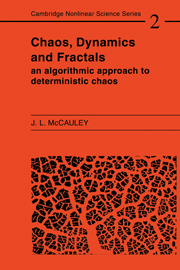Book contents
- Frontmatter
- Dedication
- Contents
- Preface
- Miscellaneous Frontmatter
- Introduction
- 1 Flows in phase space
- 2 Introduction to deterministic chaos
- 3 Conservative dynamical systems
- 4 Fractals and fragmentation in phase space
- 5 The way to chaos by instability of quasiperiodic orbits
- 6 The way to chaos by period doubling
- 7 Introduction to multifractals
- 8 Statistical mechanics on symbol sequences
- 9 Universal chaotic dynamics
- 10 Intermittence in fluid turbulence
- 11 From flows to automata: chaotic systems as completely deterministic machines
- Bibliography
- Index
Introduction
Published online by Cambridge University Press: 05 October 2013
- Frontmatter
- Dedication
- Contents
- Preface
- Miscellaneous Frontmatter
- Introduction
- 1 Flows in phase space
- 2 Introduction to deterministic chaos
- 3 Conservative dynamical systems
- 4 Fractals and fragmentation in phase space
- 5 The way to chaos by instability of quasiperiodic orbits
- 6 The way to chaos by period doubling
- 7 Introduction to multifractals
- 8 Statistical mechanics on symbol sequences
- 9 Universal chaotic dynamics
- 10 Intermittence in fluid turbulence
- 11 From flows to automata: chaotic systems as completely deterministic machines
- Bibliography
- Index
Summary
Since the beginning of physics, the study of theoretical mechanics has been synonymous with the study of the gross regularities of nature. Regularity of occurrence either in space or in time depends implicitly upon an underlying stability in the development of chains of events whereby small changes in starting conditions do not produce the need for a statistical description: nearby starting conditions must yield patterns of trajectories that are similar in appearance at later times. At the other extreme lie phenomena where attempts at reproducibility fail. They fail in the sense that ‘repeated identical experiments’, experiments where the starting conditions are as close to one another as experimental error will permit, yield very different, apparently unrelated patterns of trajectories as time goes on. This kind of behavior we call statistical. It has been widely assumed that the cause of statistical behavior is randomness, which, if one takes the word literally, is the same as saying that there is no identifiable cause at all, because the explanation of phenomena in terms of cause and effect requires a deterministic description of chains of events.
Irregularities in the form of nonequilibrium disordered phenomena were once presumed to be describable only with the aid of assumptions of randomness: a deterministic description was thought either to be impossible or else was too complicated, in principle, to be practical. One reason why a deterministic description of disorder was thought to be impractical was the incorrect but widely held belief that apparent randomness in deterministic equations required for its appearance a large number of degrees of freedom.
Information
- Type
- Chapter
- Information
- Chaos, Dynamics, and FractalsAn Algorithmic Approach to Deterministic Chaos, pp. 1 - 5Publisher: Cambridge University PressPrint publication year: 1993
